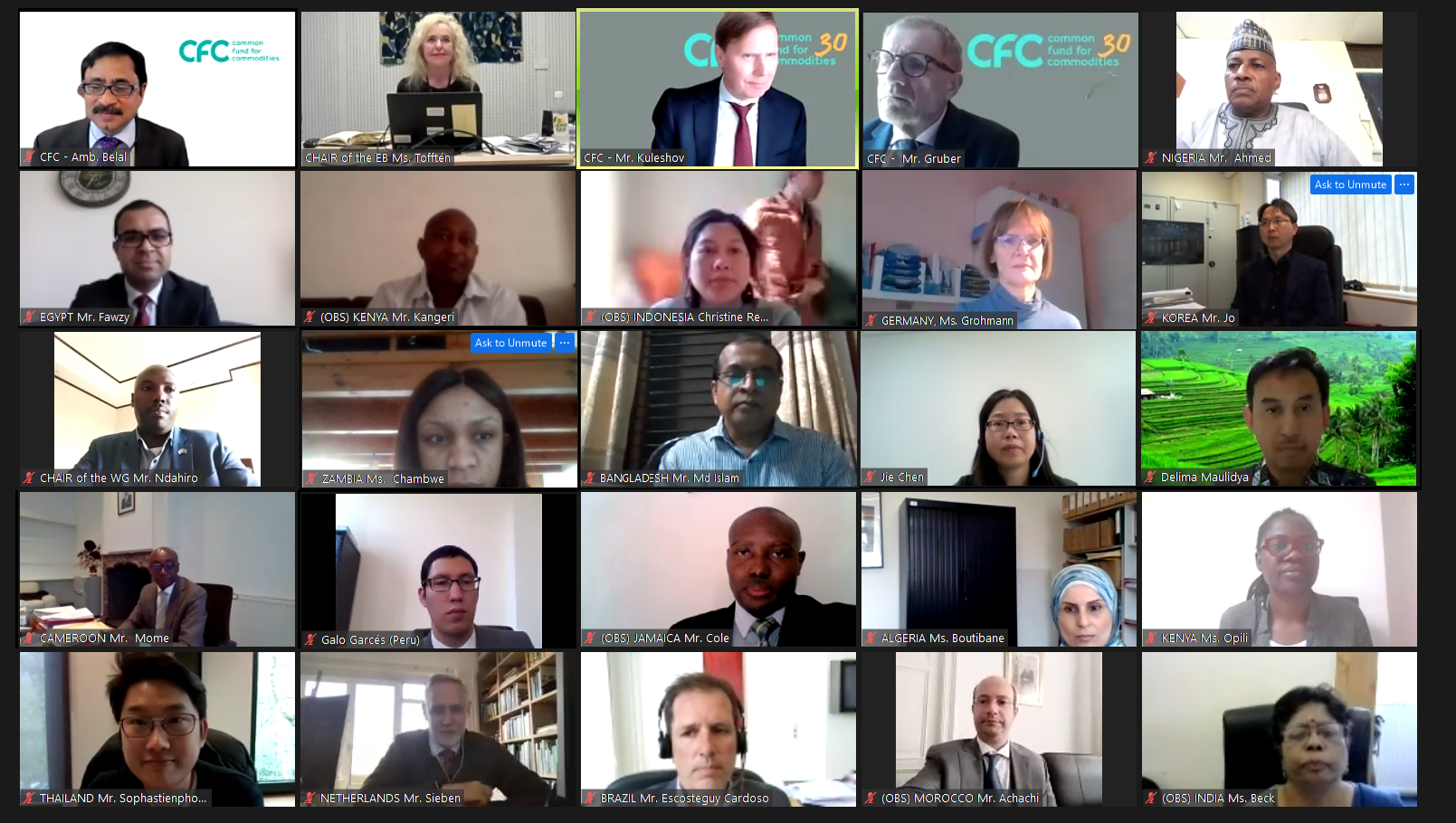CFC holds 71st Meeting of Executive Board by teleconference
On 20 April 2021, the CFC held its 71st Meeting of the Executive Board (EB), using teleconference facilities for the third time due to the restrictions posed by the COVID-19 pandemic. The meeting was chaired by Ms. Anna Tofftén (Sweden) and was well attended. It also included the participation of the newly elected Chairperson of the Consultative Committee, Ms. Jie Chen (China), and of the Minister for Agriculture & Fisheries of Jamaica, Hon’ble Mr. Floyd Green and other dignitaries from CFC’s member states and partners.
In his opening remarks, Managing Director Sheikh Mohammed Belal addressed the lingering effects of the COVID-19 pandemic on developing countries and small producers. He emphasised that Least Developed Countries, Landlocked Developing Countries, and Small Island Developing Countries must be urgently addressed. Moreover, as an increasing number of quality projects are being submitted under the Call for Proposals, member states were urged to provide the necessary support for the CFC to do justice of these good proposals, and thus, expand its impact. In this regard, the stronger focus of CFC projects on SDG 13 (Climate action), beyond its “core SDGs”, was highlighted.
Amb. Belal also referred to two CFC projects that were presented by their business owners during the Pre-EB meeting on 19 April 2021, namely Ms. Kinoti of Shalem Investments Ltd. from Kenya and Mr. Bakker of Kennemer Foods International Inc. from the Philippines. During this session, they shared their respective projects and the impact they have created, which may serve as good examples for future projects.
The EB discussed six project proposals that were submitted through the Open Call for Proposals and recommended by the Consultative Committee. After careful consideration, all projects were approved by the Board to receive CFC finance. The total cost of projects approved equals USD 68,4 million, of which the CFC contributes USD 12 million, in form of loans. These projects are based in Kenya, Tanzania (LDC), Peru, Brazil, Guatemala, Honduras, Nicaragua; they cover different kinds of commodities such as canola, avocado, soya, pulses, nuts, coffee, agrifinance. Emphasis is placed on CFC “core” SDGs, namely SDG1 (No poverty), SDG2 (Zero hunger), SDG5 (Gender equality), SDG8 (Decent work and economic growth); however, certain projects also aim at contributing to SDG12 (Responsible consumption and production), SDG13 (Climate action) and SDG17 (Partnerships for the goals). Overall, these projects combined are expected to reach 42,360 smallholder farmers, helping them to have better access to markets and increase their productivity levels.
To keep CFC operations in line with current industry best practices, the EB approved two important measures. The first is the Anti-Bribery and Corruption Policy (ABC Policy), which purpose is to make sure that whoever CFC may deal with, and wherever CFC may operate, CFC is committed to doing so lawfully, ethically and with integrity. As part of this commitment, all forms of bribery and corruption are unacceptable and will not be tolerated in the CFC. The second is the set-up of an “Independent Complaints Mechanism”. This is aimed at facilitating early indication and prompt remediation of CFC project-related complaints. Although CFC financed projects strive to achieve sustainable development impact, there may be unintended or unforeseen negative impacts on local communities and the physical environment within which they live or upon which they depend for their livelihoods. This Mechanism, therefore, ensures the right to be heard for Complainants who feel affected by a CFC financed project in order to resolve disputes and assist the CFC in drawing lessons for current and future operations.
The EB listened to Mr. Herbert Ndahiro (Rwanda), Chairperson of the Open-ended Working Group (WG) on Sustainable Fund Management, who delivered his interim report on the activities of the formation of the Commodity Impact Investment Facility (CIIF). The Chair encouraged the Member States to take active part in this effort to strengthen the public private partnership in the work of the CFC and enhance its capacity to deliver on the expectations of Members. As activities are progressing, the WG intends to deliver a recommendation to the next meeting of the EB in October 2021, and to bring this to the attention of the Governing Council in December 2021 for their consideration.
Given the disruptions that the COVID-19 pandemic has brought worldwide for a year now, the CFC has managed to continue operating efficiently and presented its adaptation measures to the EB. Local consultants were hired to conduct due diligence or other on-site works on behalf of the CFC. Moreover, the CFC unlocked an Emergency Liquidity Facility (ELF) in June 2020 as a focused instrument to mitigate the impact of the pandemic, and allowed for more flexibility to amend repayment schedules of CFC loans in compelling cases. This year-long adaptation has thus revealed significant findings. Despite all the challenges, some changes proved to be positive and the CFC, with the support of the EB, is reflecting on the lessons learned to prepare the CFC for the future.
The EB can be seen as a success as it not only deliberated on the important agenda items that were very timely and relevant, or for the projects that it approved, but it also worked harder to make the CFC ready for a green recovery after the pandemic. Only joint efforts, innovation and resilience will help achieve greater impact.
All News

